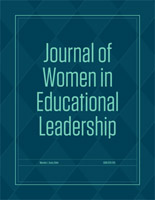Educational Administration, Department of

Journal of Women in Educational Leadership
Date of this Version
10-2008
Document Type
Article
Citation
Journal of Women in Educational Leadership, Vol. 6, No. 4-October 2008 ISSN: 1541-6224
Abstract
At our university about 40% of the full-time faculty members are 55 years of age or older, which led me to consider what a difference they could make in this world if, upon retirement, they used their knowledge, skills. and talents to benefit others. Four dimensions that can serve to differentiate effective from ineffective educators and people were used as the framework to profile three individuals and the work they are doing to benefit others. These dimensions include building community, opportunity, and relationships, and developing people as good citizens. For this discussion, I chose to profile individuals who are not being paid for the work they are doing to benefit others. At our university about 40% of the full-time faculty members are 55 years of age or older, which led me to consider what a difference they could make in this world if, upon retirement, they used their knowledge, skills, and talents to benefit others. I have spent my professional life teaching educators and studying the impact of educators' beliefs, values, and attitudes on their effectiveness. Mark Wasicsko (2007), in his research on educator dispositions (i.e., beliefs, values, and attitudes), drew upon the work of Arthur W. Combs to define four dimensions that can serve to differentiate effective from ineffective educators and, I believe, people. Persons strong in the perceptions of self dimension are able to identify with and feel compassion for all persons, regardless of race, creed, or national origin. It's all about community. Persons strong in the perceptions of others dimension see others as able, which promotes positive growth and development. It's all about opportunity. Persons strong in the frame of reference dimension are concerned with the welfare of people in contrast to things. It's all about relationships. Persons strong in the perceptions ofpurpose dimension view their work in the larger context, concerned with the development of people as good citizens. I believe I have found three people who exemplify the dimensions and can provide us with some concrete ways to make the world a better place. For this discussion, I chose to profile people who are not being paid for the work they are doing to benefit others.


Comments
Copyright © 2008 Pro>Active Publications. Used by permission.